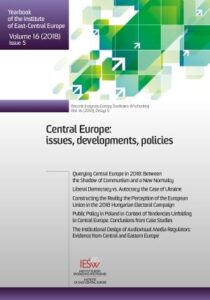ORCID: Katarzyna Górak-Sosnowska: 0000-0002-1121-6240
Pages: 141-158
Edition: Lublin 2018
DOI: --
Citation method: Katarzyna Górak-Sosnowska, Irina Molodikova, ‘‘Polish, Hungarian, Cousins Be’: Com-parative Discourse on Muslims and the Refugee Crisis in Europe’, Yearbook of the Institute of East-Central Europe, Vol. 16, No. 5, 2018, pp. 141-158.
Abstract:
Hungary and Poland used to have much in common, as the saying in the title suggests. Yet, it seems that in recent years, this phrase has acquired new meaning as both countries became enfants terrible in EU politics. One of the earliest and most significant indicators of this change was their stance towards Muslims and refugees during the 2014 crisis in Europe. The paper analyses how the similar historical development in both countries and ethnic interests shaped their domestic and international policy towards symbolic and real benefits from the crisis even though the refugees in Hungary left at the beginning of 2016 and Poland had not even been touched by it. For that purpose, the political and social discourse on Muslims and the refugee crisis in Hungary and Poland were compared. Interestingly, both countries lack any significant Muslim or refugee communities and so their anti-Muslim and antirefugee sentiments have to be framed around an EU narrative. Thus, Hungarian and Polish membership in the EU seems to be modulated in relation to the refugee crisis and European Muslim communities and used to further the national political agenda.
Bibliography:
Al Jazeera, ‘Hungary awaits Muslim tourists while promoting anti-refugee rhetoric’, Aljazeera, 31 December 2015, america.aljazeera.com/articles/2015/12/31/hungary-awaits-muslim-tourists-while-promotinganti-refugee-rhetoric.html [2018-08-08].
Bayraklı, E. and F. Hafez, Introduction, in: E. Bayraklı and F. Hafez, European Islamophobia Report 2014, SETA, Istanbul, 2015.
Carnegie Europe, ‘Witold Waszczykowski and the new sound from Warsaw’, 16 March 2016, carnegieeurope.eu/strategiceurope/?fa=63057[2018-08-08].
CBOS, Stosunek Polaków do przyjmowania uchodźców [Attitude of Poles towards accepting refugees], Warszawa, 2016.
Deutsche Welle, ‘Outcome – Visegrad leaders: Merkel meets European critics of her refugee policies’, Deutsche Welle, 26 August 2016, www.dw.com/en/visegrad-leaders-merkel-meets-european-critics-of-her-refugee-policies/a-19504957 [2018-08-08].
Eurobarometer, Public Opinion in the European Union, European Commission, 2015.
European Parliament, Report on the situation of fundamental rights: standards and practices in Hungary (pursuant to the European Parliament resolution of 16 February 2012), (2012/2130(INI)), 24 June 2013.
Eurostat, Asylum Quarterly Report, 9 December 2015, ec.europa.eu/eurostat/statistics-explained/index.php/Asylum_quarterly_report [2018-08-08].
Friedrich Ebert Stiftung, Intolerance, Prejudice and Discrimination. A European Report, Berlin 2011.
Gazeta.pl, ‘Debata o uchodźcach. Kaczyński: „We Włoszech kościoły traktowane są jak toalety”. Kopacz nie wytrzymuje’ [Debate about refugees. Kaczyński: “In Italy churches are treated as toilets”. Kopacz cannot stand it], Gazeta.pl, 16 September 2015, http://wyborcza.pl/1,75398,18830888,debatao-uchodzcach-kaczynski-we-wloszech-koscioly-traktowane.html [2018-08-08].
Gazeta.pl, ‘Jarosław Kaczyński boi się, że uchodźcy sprowadzą zarazę? Tak mówił na wyborczym wiecu’ [Jarosław Kaczyński is afraid that refugees will disseminate plague], Gazeta.pl, 13 October 2015, http://wyborcza.pl/1,75398,19014711,kaczynski-boi-sie-zarazy.html [2018-08-08].
Gazeta.pl, ‘Sejm przegłosował: Nie dla uchodźców. To oni są powodem napięć’ [Sejm has voted: No to refugees. They cause tensions], Gazeta.pl, 1 April 2016, http://wyborcza.pl/1,75398,19851173,sejm-przeglosowal-nie-dlauchodzcow-to-oni-sa-powodem-napiec.html [2018-08-08].
Gellner, E., Nations and Nationalism, Oxford: Blackwell, 1991.
Górny, A. and D. Pudzianowska, EUDO Citizenship Observatory Country Report: Poland, June 2013.
HVG, ‘Nyilvános a lista az elismert egyházakról’ [Official list of recognized churches], 23 April 2012, http://hvg.hu/itthon/20120423_elismert_egyhazak[2018-08-08].
IPSOS, Perceptions are not reality: Things the world gets wrong, 29 October 2014, www.ipsos-mori.com/researchpublications/researcharchive/3466/Perceptions-are-not-reality-Things-the-world-gets-wrong.aspx [2018-08-08].
IPSOS, Perils of Perception 2015. A 33 Country Study, 2015, www.ipsosmori.com/Assets/Docs/Polls/ipsos-perils-of-perception-charts-2015.pdf [2018-08-08].
Magyar Idök, ‘Azt akarjuk, hogy unokáink egy európai kalifátusban éljenek?’, Magyar Idök, 14 November 2015, magyaridok.hu/belfold/azt-akarjuk-hogy-az-unokaink-egy-europai-kalifatusban-eljenek-5035/ [2018-08-08].
Mazzucelli, C. G. and A. Visvizi, R. Bee, ‘Secular States in a “Security Community”: The Migration-Terrorism Nexus?’, Journal of Strategic Security 9(3), Fall 2016, pp. 16-27, DOI: http://dx.doi.org/10.5038/1944-0472.9.3.1545.
Molodikova, I., ‘Formation of new Muslim communities in new member states: the case of Hungary’, in: K. Górak-Sosnowska (ed.), Muslims in Poland and Eastern Europe. Widening the European Discourse on Islam, Warsaw: University of Warsaw, 2011, pp. 222-239.
Molodikova, I., ‘Guardian Opinion. The refugee crisis is waking old fears in central Europe’, The Guardian, 20 September 2015, www.theguardian.com/commentisfree/2015/sep/20/refugees-hungary-croatia-muslimstensions[2018-08-08].
Pew Research Center, Europeans Fear Wave of Refugees Will Mean More Terrorism, Fewer Jobs, 11 July 2016, www.pewglobal.org/2016/07/11/europeans-fear-wave-of-refugees-will-mean-more-terrorism-fewer-jobs/ [2018-08-08].
Polskie Radio, ‘Rośnie liczba wniosków o status uchodźcy w Polsce’ [The number of asylum applications in Poland grows], Polskie Radio, 26 December 2015, http://www.polskieradio.pl/5/3/Artykul/1562174,Rosnie-liczba-wnioskow-o-status-uchodzcy-w-Polsce [2018-08-08].
Sereghy, Z., ‘Islamophobia in Hungary: National Report 2015’, in: E. Bayraklı and F. Hafez, European Islamophobia Report 2014, SETA, Istanbul, 2015.
Sputnik, ‘PR Gone Too Far: Hungary Politicians Capitalize on Refugee Tragedy’, Sputniknews, 11 October 2015, http://sputniknews.com/europe/20151011/1028324726/hungary-refugee-pr.html [2018-08-08].
Stankiewicz, A., ‘Niechęć do UE nową doktryną PiS’, Rzeczpospolita, 31 January 2016, http://www.rp.pl/eurosceptyczny_pis [2018-08-08].
Szentágotay, R., ‘Magyarországi Szunnita Muszlim közösségek az ideológia, integrációs politika, és a radikalizáció megelőzésének tükrében’ [Hungarian Sunni Islamic community – ideology, integration policy and preventing radicalisation], Le Monde Diplomatique, September 2015.
Visvizi, A., ‘Querying the Migration-Populism Nexus: Poland and Greece in Focus’, IED Discussion Paper, July 2017, Brussels: Institute of European Democrats (IED).

PDF: Download